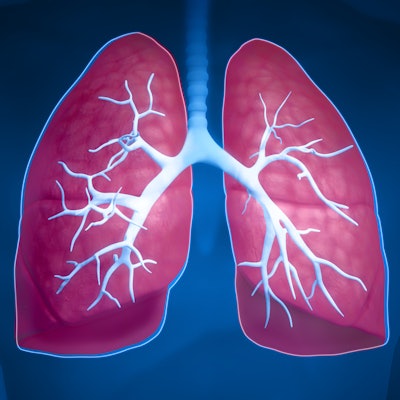
One of the thorniest problems in medical imaging is reporting and tracking incidental findings. Not following up on a finding -- say, a suspicious lung nodule on a CT scan -- can have disastrous consequences for patients and practices alike. A new service being launched this week hopes to make the task easier.
Deep Dive Analytics is a new service being launched by revenue cycle management firm Healthcare Administrative Partners (HAP) to leverage the power of data analytics to help radiology facilities track incidental nodules on chest CT scans. The offering is designed to make it easier and more effective for imaging facilities to follow up incidental findings, compared with trying to track down patients on their own.
HAP is launching the service this week at the Radiology Business Management Association (RBMA) Paradigm meeting in San Diego.
An unmanageable job
Medical imaging technology has become increasingly effective at detecting suspicious structures in the human body, but sometimes that's the easy part: The hard part is figuring out whether suspicious findings are malignant. Even getting patients to return for a second scan can be a chore for some busy practices. One study published in the Journal of the American College of Radiology in 2014 found that 71% of patients were not returning for recommended follow-up.
Typically, a radiologist notes an incidental finding in his or her report, which is sent to a PACS or RIS. But since the finding isn't the primary reason why the patient was referred for a study, it's anyone's guess whether it will actually be followed up.
Some imaging facilities have clinical care coordinators who review spreadsheets to see which patients should be tracked. However, the process isn't always foolproof, and some recommendations for follow-up can fall through the cracks, according to Sharon Taylor, vice president of clinical informatics at HAP.
"It's really an unmanageable job right now as far as technology goes," she told AuntMinnie.com. "It's not for lack of trying; it's for lack of technology."
That's where Deep Dive Analytics comes in. The idea for the service came from Radiology Group of Abington (RGA) in Pennsylvania, one of HAP's customers in its main business of revenue cycle management, in which the company analyzes a radiology practice's coding, reimbursement, and other financial factors to make sure it's operating at peak efficiency. RGA noted that only 35% of its patients were returning for recommended follow-up appointments. Could HAP help?
That led the company to form a new clinical informatics division in 2016, with Taylor leading the unit. HAP began developing the software in January 2017, leading up to this week's launch at RBMA 2018.
How does it work? HAP's customers are already transferring their financial data to the company for analysis. Taylor's team has written HL7 interfaces to capture clinical data as well, and it's this information that Deep Dive Analytics processes to detect patients with incidental findings, using clinically accepted criteria such as Fleischner Society guidelines and Lung-RADS scoring. The software also notes patient demographic factors that could influence lung cancer risk, such as smoking history.
The service then notifies a patient's primary care physician of the incidental finding and the recommendation for follow-up. The software also includes automated logic that checks on the patient's status, noting whether the nodule has grown or whether it took longer than recommended for a follow-up to take place. Finally, the software has a practice productivity module that provides reports, graphs, and other data to customer sites, enabling them to analyze the software's impact on whether patients return for checkups.
Deep Dive Analytics has been in operation at RGA and several beta sites, and HAP discovered that the rate of patients returning for follow-up has increased 90% compared with sites that had no follow-up program in place. Also, among patients who received notification letters, 23% had a medical condition that was new or getting worse. HAP has expanded the software to cover implanted inferior vena cava (IVC) filters, and it plans to add the ability to analyze liver, kidney, and thyroid scans in the near future.
Ultimately, HAP believes that Deep Dive Analytics will not only help radiology practices provide better care to their patients but also improve their relationships with their hospital clients, according to Richard Morris, director for value-based strategy at HAP.
"We are trying to advance our clients, to help them get back to the center of care coordination and being proactive stewards of patient health," Morris said. "The radiology practices will be the center of this, and it will help them with hospitals."



















